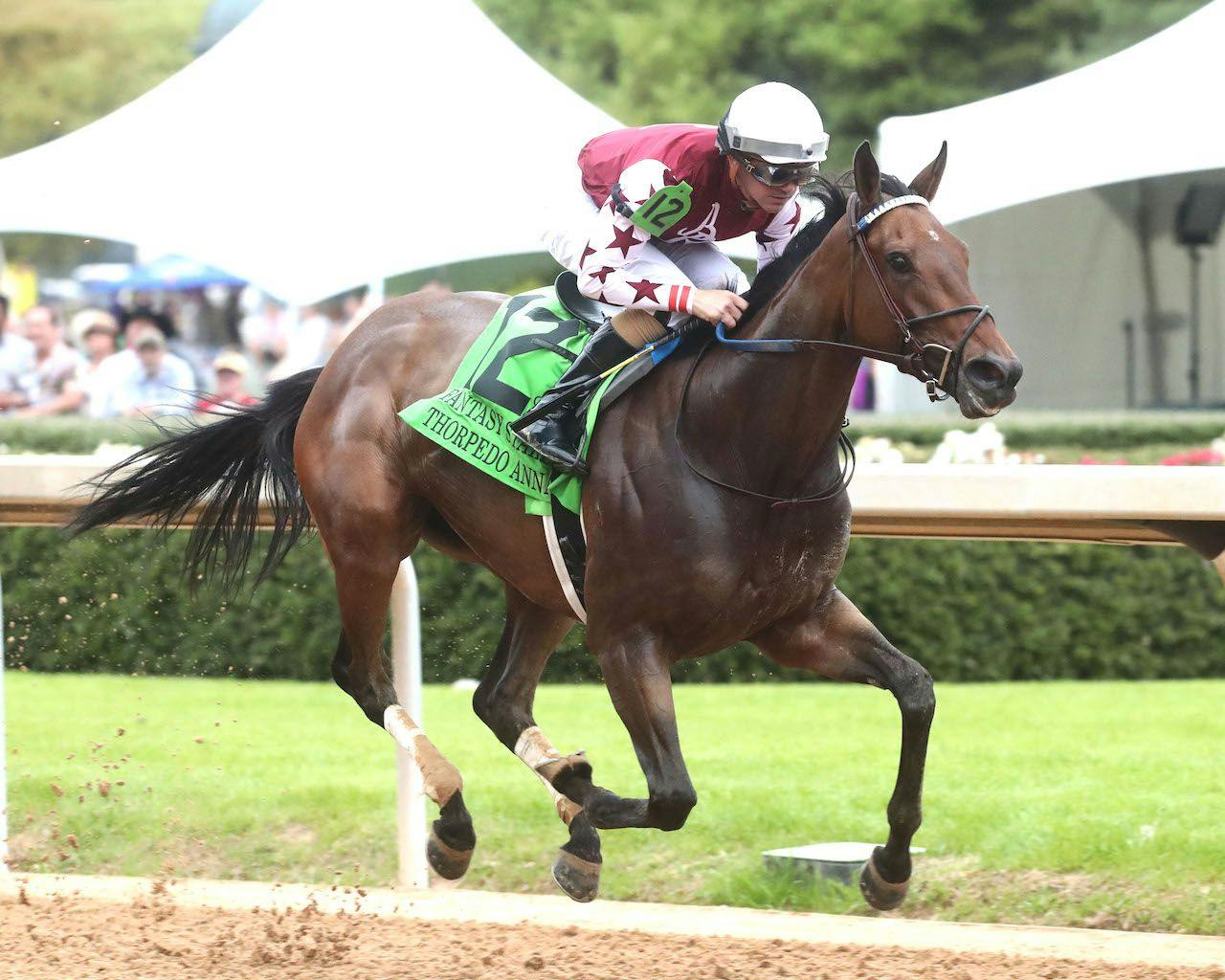Why I voted nay on Thorpedo Anna for Horse of the Year

Thorpedo Anna wins the Fantasy (G2) at Oaklawn Park (Photo by Coady Media/Renee Torbit)
When the 2024 Eclipse Awards ceremony is held in late January, the most likely name to be pulled from the envelope containing the voters' choice as Horse of the Year is Thorpedo Anna. If that proves the case, for the ninth time in my 25 years as a member of the electorate, my choice will be a minority one.
There's no question Thorpedo Anna had an outstanding season. She steamrolled through her division, virtually clinching the three-year-old filly championship by late July having added the Coaching Club American Oaks (G1) to prior wins in the Acorn (G1), Kentucky Oaks (G1), and Fantasy (G2).
After faring better than any filly has in the Travers (G1) in nearly a century, Thorpedo Anna concluded her campaign with a hard-fought win in the Cotillion (G1) and a more facile success in the Breeders' Cup Distaff (G1).
While Thorpedo Anna's record holds up extremely well compared to most three-year-old filly championship campaigns of the past, it does not when judged against the records of the three sophomore fillies previously crowned Horse of the Year.
As all Grade 1 races or their historical equivalents are not created equal, that by itself is not a proper criteria for supporting Thorpedo Anna's candidacy. A granular look at those she won shows all but the Breeders' Cup Distaff were restricted to her own age and sex.
And there was very little substance to this year's Distaff field. When reigning older female champion Idiomatic was abruptly retired before her Distaff title defense, Thorpedo Anna's path to victory became far easier. She ultimately won like a 2-5 favorite should have.
Contrast this record with Twilight Tear's in 1944, when she won four stakes open to males, including the Pimlico Special against that season's champion older male Devil Diver. Or Busher's in 1945, when she too won four stakes open to males, including the lucrative Arlington and Washington Park Handicaps against older. In our own time, Rachel Alexandra won the Preakness (G1) and Haskell (G1) against fellow three-year-olds and the Woodward (G1) against older in 2009.
Thorpedo Anna's candidacy really rests on her performance in the Travers, which she narrowly lost to Fierceness while finishing 1 3/4 lengths clear of Sierra Leone. The latter subsequently won the Breeders' Cup Classic (G1) over Fierceness, tying their season head-to-head battle at two apiece.
THE CHAMP IS BACK! 🏆
— TwinSpires Racing 🏇 (@TwinSpires) August 24, 2024
FIERCENESS wins the 155th running of the Travers (GI) at #Saratoga
Jockey: @ljlmvel
Trainer: @PletcherRacing
Owner: @RepoleStable pic.twitter.com/2drFLnqFhZ
If Fierceness had prevailed in the Classic over Sierra Leone (and he arguably ran the better race of the two having lost by 1 1/2 lengths after rating much closer to a scorching pace), this Horse of the Year debate wouldn't be much of one. But Sierra Leone's victory threw a monkey wrench into the matter, thus paving the way for the popular Thorpedo Anna.
That Thorpedo Anna outran Sierra Leone in the Travers and thus was vindicated by proxy in the Breeders' Cup Classic is an unsatisfactory take. Her connections could have chosen to take another actual shot at both colts in the Classic but declined to do so, judging the Cotillion and Breeders' Cup Distaff more worthy of her attention and talents.
While there are no exact historical analogies, the one that comes closest occurred in 2007. That year, Rags to Riches became the first filly in more than a century to capture the Belmont (G1), defeating colt champion Curlin, who subsequently beat older rivals in the Jockey Club Gold Cup (G1) and Breeders' Cup Classic. I do not recall hearing any suggestions that Rags to Riches had been vindicated by proxy following either race.
The events of the season have made it difficult to judge whether Sierra Leone or Fierceness was the more worthy champion of their division. What is not in dispute, in my view and historically, is that either would be a more worthy selection as Horse of the Year than Thorpedo Anna.
ADVERTISEMENT



